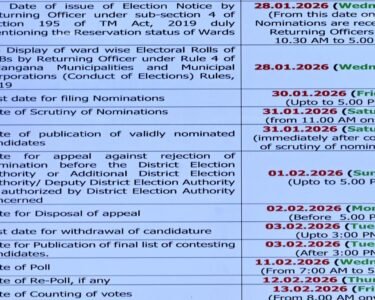In a noteworthy development in Telangana’s law-and-order landscape, Manda Ruben alias Kannanna — a senior functionary of the banned CPI (Maoist) — formally surrendered to police authorities in Warangal district. He laid down arms before Warangal Police Commissioner Sunpreet Singh at the commissionerate in Hanamkonda, ending over four decades of his underground existence. Deccan Chronicle+2PTI News+2
Ruben, aged 67, has been a prominent figure in Maoist ranks, serving as Division Committee Secretary for the South Bastar Division, and was associated with the Dandakaranya Special Zonal Committee. Deccan Chronicle+1 The surrender was effected in an official event and has drawn attention from law enforcement, political, and civil society observers alike.
Early Years & Radicalization
Ruben’s ideological journey began in 1979, when, while working in the mess at what was then the Regional Engineering College (now NIT Warangal), he came under the influence of radical thought and leftist revolutionary ideas. Deccan Chronicle+2PTI News+2 He officially went underground in 1981 to join the Maoist movement. Deccan Chronicle+2PTI News+2 Over the years, he worked across various zones, including Bastar and Kunta squads, and was involved in multiple operations. Deccan Chronicle+2Devdiscourse+2
In 1991, he was arrested by Chhattisgarh police during treatment but escaped from Jagdalpur Jail in 1992 along with other cadres. Deccan Chronicle After resuming his underground role, he continued to provide support, strategic guidance, safe shelter, and logistical help to cadre even when his direct involvement in actions lessened over time. Deccan Chronicle+2Devdiscourse+2
By the 2000s, due to health constraints, his operational activity declined, but he remained influential in the network’s support systems. Devdiscourse+2Deccan Chronicle+2
Reasons for Surrender
According to police statements, Ruben surrendered for several interlinked reasons:
- Poor health and lack of physical strength: At 67, he asserted that his declining health prevented him from undertaking the rigours of underground life. Deccan Chronicle+2Devdiscourse+2
- Ideological disillusionment: He expressed disillusionment with the efficacy of Maoist violence and felt that public resentment against such tactics was growing. Deccan Chronicle+2Devdiscourse+2
- Desire for peaceful life: Ruben stated that he wished to return to normalcy and live with his family under protective state policies. Deccan Chronicle+2Devdiscourse+2
- Changing ground realities: He reportedly felt that the armed struggle had lost practical relevance in many areas, and the legal pressure and counter-insurgency operations had made sustained underground work far more difficult. Devdiscourse+2Deccan Chronicle+2
The police have indicated that Ruben will be moved under the state’s Rehabilitation and Resettlement Programme for surrendered Maoists. Deccan Chronicle+1
Police & Government Response
At the surrender event, Commissioner Sunpreet Singh noted that the surrender was significant not just for losing a senior cadre from the Maoist hierarchy, but also as a symbolic sign of weakening resolve within the movement. Deccan Chronicle+1 The official emphasized that Ruben’s decision reflected an acceptance that violent methods were losing ground politically and socially. Deccan Chronicle
Authorities also reiterated that the surrender and rehabilitation policy remains a crucial tool in counterinsurgency planning — offering incentives for those leaving militancy to rejoin civilian life. Devdiscourse+2PTI News+2
Security analysts see this surrender as a morale blow to Maoist cadres in the Telangana–Chhattisgarh border zones, where operations have been intensified. The removal of an elder, respected leader from the fold could affect loyalty and cohesion.
Implications for Maoist Movement & Regional Security
Ruben’s surrender comes amid a pattern of high-profile surrenders in Telangana and surrounding states, especially among aging or health-plagued cadre who find it untenable to continue the underground life. PTI News+3Devdiscourse+3PTI News+3 Observers believe that such defections may cascade, weakening trust, recruitment, and cohesion in already stressed guerrilla units.
It also provides the government with a publicity moment to promote the success of surrender and rehabilitation schemes, potentially encouraging other cadres to follow suit. Analysts caution, however, that without credible incentives and integration support, such abandonments may be symbolic unless backed by systemic measures (jobs, social acceptance, security).
From a security perspective, this could ease pressure in districts like Warangal, where Maoist presence has been persistent. It may allow police forces to reallocate resources and intensify area domination efforts. On the flip side, there is risk of reprisals, internal retrenchment from remaining cadres, or emergence of splinter groups seeking revenge.
Challenges & Caveats
While Ruben’s surrender is significant, its long-term impact depends on several factors:
- Genuine rehabilitation: Unless the government ensures proper resettlement, livelihood support, and protection, surrendered members may relapse into illegality or remain marginalized.
- Community acceptability: In areas where Maoist influence was entrenched, trust deficits may make reintegration socially challenging.
- Security guarantees: Rivals or rogue elements might see surrenderers as collaborators, raising risk to their personal safety.
- Leadership vacuum: Remaining Maoist units may attempt to fill gaps aggressively, possibly leading to more violent skirmishes in short term.
- Symbolic vs structural change: One high-profile surrender does not necessarily mean ideological collapse — unless followed by systematic attrition, de-radicalisation, and grassroots disengagement.
Conclusion: A Turning Point or Momentary Shift?
The surrender of Manda Ruben alias Kannanna represents an important moment in Telangana’s counter-insurgency journey. It underscores the strains within the Maoist movement — from ageing cadre, health issues, ideological fatigue, and intensified state pressure. But whether this signals a decisive turning point or remains a symbolic drift depends on how both the leadership and the state handle the transition.
If the rehabilitation machinery works effectively, this event could catalyze further disengagement among cadres and reduce armed conflict zones. Conversely, if follow-through is weak, Ruben’s surrender may be remembered as a solitary gesture rather than one marking decline. For now, it is a moment of transition — one that will test the durability of the state’s approach and the resilience of the guerrilla movement in Andhra-Telangana terrain.
If you like, I can also prepare a shorter 300-word summary or a news-style version for publication. Do you want me to do that?
Do Follow Us Instagram







